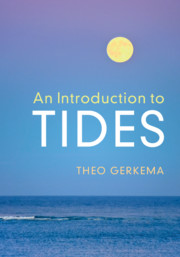Book contents
- Frontmatter
- Contents
- Acknowledgements
- 1 Introductory Concepts
- 2 Tidal Forcing
- 3 Celestial Motions
- 4 Tidal Constituents and the Harmonic Method
- 5 Tidal Wave Propagation
- 6 Tides in Coastal Seas and Basins
- 7 Internal Tides
- Appendix A Mathematical Formulae
- Appendix B Depth-Averaged Shallow-Water Equations
- References
- Index
6 - Tides in Coastal Seas and Basins
Published online by Cambridge University Press: 08 June 2019
- Frontmatter
- Contents
- Acknowledgements
- 1 Introductory Concepts
- 2 Tidal Forcing
- 3 Celestial Motions
- 4 Tidal Constituents and the Harmonic Method
- 5 Tidal Wave Propagation
- 6 Tides in Coastal Seas and Basins
- 7 Internal Tides
- Appendix A Mathematical Formulae
- Appendix B Depth-Averaged Shallow-Water Equations
- References
- Index
Summary
This chapter focuses on tides in coastal seas and basins, where nonlinear and frictional effects are generally important. The depth-averaged shallow-water constituents are derived (Appendix B). The origin of shallow-water constituents is explained. A simple example is analyzed of tidal flow over a bank to explain the principles behind tide-induced residual circulation. Implications for chaotic stirring are discussed. Co-oscillation and resonance in tidal basins are analyzed for simple configurations, including the effects of frictional and radiation damping. The Helmholtz oscillator is explained.Finally, the focus shifts from depth-averaged currents to the vertical structure (Ekman dynamics, tidal straining, strain-induced periodic stratification in estuaries). The decomposition of tidal currents in phasors (rotary components) is elucidated.
Keywords
Information
- Type
- Chapter
- Information
- An Introduction to Tides , pp. 122 - 156Publisher: Cambridge University PressPrint publication year: 2019
